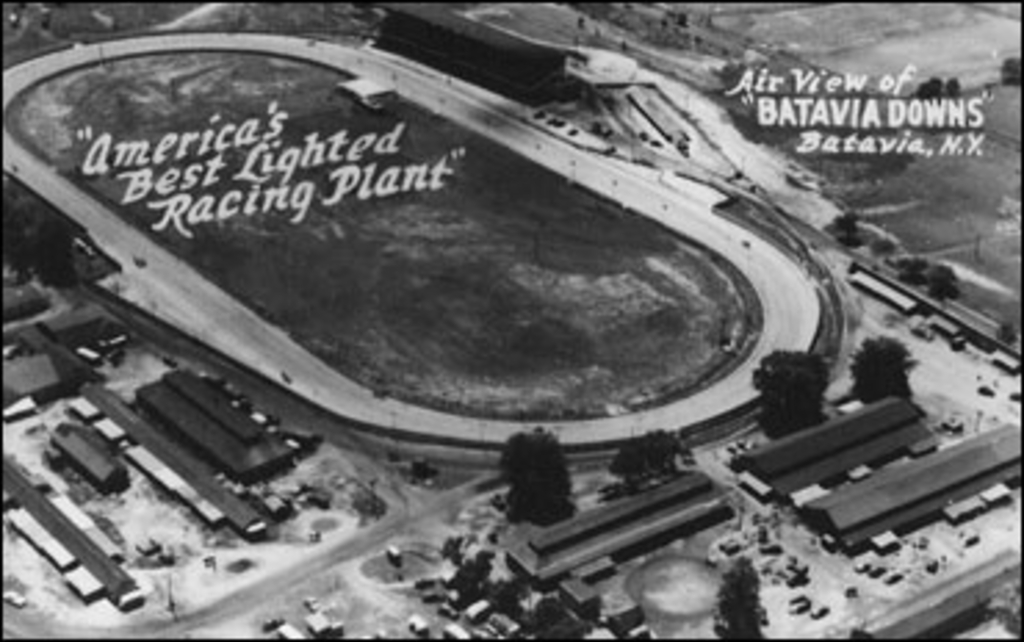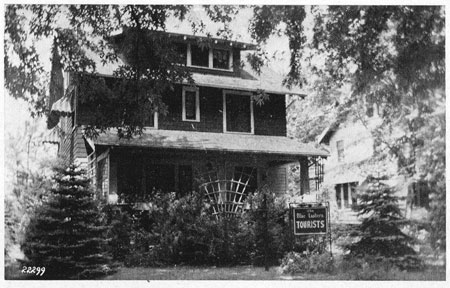
SC Rewind's Robert Smith talks about his first memories of night-time harness racing and also recalls landing a pretty important job
.
My first encounter with night racing took place on foreign soil. Well, OK, that sounds a little exotic but it was in the U.S., 40 miles from the border...Batavia Downs to be exact. The actual year I don't recall but it was likely about the mid 1950's. It was a long trip and the farthest I had ever been away from home. The big places along Highway 3 like St. Thomas, Tillsonburg and Delhi I had heard of, but the never ending small hamlets like Nelles Corners, Wainfleet and Winger were new to me. It was a long eight hours but I knew it would be worth it. Racing under the lights had yet to come to Ontario but was already popular in New York State.
Arriving at the track was a thrill I can never forget. Barn after barn that circled the track; horses galore. Because my father owned a horse, we were able to get directly into the stable area, right where everything was happening. I don't recall a lot of security being in force; a nod and a "hello" and in we went. Rows and rows of horses, most with stall markers bearing their names was a sight to behold. Each horse had a nice wooden trunk at the front of the stall opening.
 Our lodging spot was a tourist home right near the track. It was called "The Blue Lantern", operated by a delightful older lady named Mrs. Hawker. Check in was pretty simple, no room number, it was just the room up the stairs and on the right. No cards to fill out and for sure no key was issued. I'm not sure if even the front door was ever locked. Tourist homes by the way for the uninitiated were a sort of bed and breakfast type place but with no breakfast, just a room.
Our lodging spot was a tourist home right near the track. It was called "The Blue Lantern", operated by a delightful older lady named Mrs. Hawker. Check in was pretty simple, no room number, it was just the room up the stairs and on the right. No cards to fill out and for sure no key was issued. I'm not sure if even the front door was ever locked. Tourist homes by the way for the uninitiated were a sort of bed and breakfast type place but with no breakfast, just a room.
Up early the next day and after breakfast at Victor's Restaurant it was off to the track. It was a busy time for me as I wanted to visit everyone I could. My father's horse was in Harold Wellwood's barn. I started at the top of the shed row and worked my way down. All of the grooms were older gentlemen and as friendly as could be. They didn't seem to mind a "nosey" kid asking a lot of questions.
At the far end of the stable was a kindly gentleman named James Winkett. He had taken a liking to Harold and stabled with him so he could drive his horse. Mr. Winkett had some age on him, just how old I don't know. He was a retired railroader and hailed from a place called Little Valley, N.Y., which I presumed wasn't too far away. As we chatted he asked me how would I like to make some money? That idea always appealed to me so I said "Yes" right away. His one horse, an old trotter named Robert Lewis was in that night and he wanted me to walk him after the race. Could I have been more thrilled or what??
Once back at the room I told my mother of my good fortune. She was somewhat less than excited. Why? The rules had already been bent as I was wearing my new jeans and plaid shirt purchased for the first day of school. What if the horse kicked or reared up or bolted? She didn't know Robert Lewis...He was an old trotting gelding with a record of 2:12 and change but was much more comfortable around the 2:15 mark. He didn't appear as though he was much of a threat.
I recall he was in the first or second race and the outcome was less than 'story-book', maybe a fourth or fifth place finish. Once unharnessed and bathed my job began. How long could this take and soon I would have my money? I of course wouldn't dare ask what I would be paid. Maybe 15 or 20 minutes and I would have the money in my pocket!
I walked and I walked and then he checked the horse. "Keep going, you're doing a good job..." Another half hour passed and each time he checked under the blanket and gave the horse a drink I couldn't help thinking it won't be long now. So I kept walking, trying different routes, always circling around a bunch of mud puddles from the recent rain. Already an hour had gone by. I just couldn't help thinking how I would spend my money, and wondering how much it would actually be.
Finally after at least an hour and a half (or so it seemed) the good news was delivered. The horse was diagnosed as 'cooled out' and my longer than anticipated assignment was over. Mr. Winkett smiled, patted me on the back and said "Thank You." He then went into his tack room and slowly returned with a crumpled U.S. $1.00 bill. Thus ended my first job of "Hot Walking" as it was called back in those days.
I learned first hand that all of the glory that happens out on the track was accompanied by a lot of not so glamorous work behind the scenes. It was an experience I shall never forget and a memory I will cherish forever; it is now worth a lot more than that old dollar bill.

